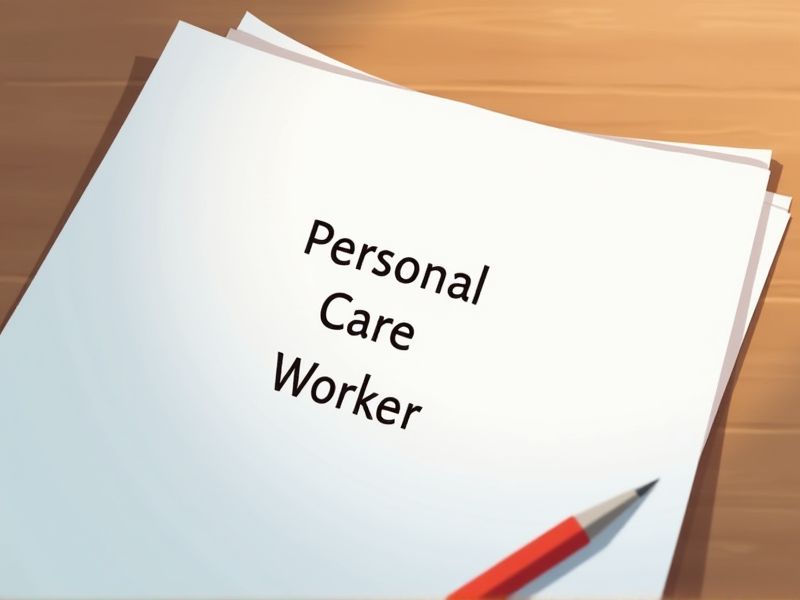
Personal Care Workers play a crucial role in providing essential support to individuals with varying health and mobility needs. Acquiring specific certifications enhances their ability to deliver safe, effective, and compassionate care. Certifications ensure that workers are trained to handle emergencies, understand medical protocols, and maintain high standards of hygiene. Here are some important certifications you may need to operate as a Personal Care Worker.
Personal Care Worker Certification
Personal Care Worker Certification ensures that individuals have the necessary skills and knowledge to provide quality care, which directly impacts patient safety and well-being. Certification validates a worker's competency, which can lead to increased trust from both employers and clients. The certification process often includes training on managing various health conditions and understanding legal responsibilities, reducing the risk of errors in care. Having a certified workforce can also elevate industry standards, leading to more consistent and reliable care across the board.
Home Health Aide Certification
Home Health Aide Certification ensures that a personal care worker is trained in essential skills like basic medical assistance and emergency response, which enhances patient safety. Certified aides demonstrate a standardized level of competency, making them more reliable and increasing the quality of care provided to clients. Certification offers a layer of accountability, reducing liability issues for both the worker and their employer. Increased expertise gained through certification can lead to better job opportunities and higher wages for personal care workers.
Certified Nursing Assistant (CNA) Certification
Obtaining a Certified Nursing Assistant (CNA) certification equips Personal Care Workers with foundational healthcare skills necessary to efficiently support patients' daily activities. A CNA certification ensures that Personal Care Workers have received standardized training, enhancing the quality and consistency of care provided. Healthcare agencies often require CNA certification as it demonstrates a verified level of competency and professionalism. The certification process educates Personal Care Workers about important medical protocols, decreasing the likelihood of errors and improving patient outcomes.
CPR and First Aid Certification
Personal care workers often encounter emergency situations where CPR and First Aid skills can save lives. Certification ensures they are equipped to handle medical emergencies promptly and efficiently. Training in CPR and First Aid also boosts confidence in care delivery, promoting safer environments for clients. Agencies and clients often require certification as it signifies professionalism and commitment to safety standards.
Basic Life Support (BLS) Certification
Personal Care Workers often face situations involving medical emergencies where immediate response is crucial; BLS certification equips them with the skills to sustain life until professional help arrives. Certification in BLS ensures that workers can perform essential procedures like CPR effectively, which can dramatically increase survival rates in cardiac arrest cases. Knowledge obtained through BLS training enhances a worker's ability to quickly assess and address life-threatening situations, reducing the risk of permanent damage or fatalities. Employers value BLS certification as it demonstrates a commitment to safety and preparedness, thus potentially increasing employment opportunities for personal care workers.
Medication Administration Certification
Medication Administration Certification is needed for Personal Care Workers because it ensures they are equipped with the necessary skills to safely administer medications to patients. A certification process reduces the risk of medication errors, enhancing patient safety and care quality. Training in medication administration helps personal care workers comply with regulations and standards set by healthcare authorities. Certification can also improve job prospects and career advancement for personal care workers by demonstrating their competence and dedication.
Infection Control Certification
Personal care workers frequently engage with vulnerable individuals, increasing the risk of spreading infections. Infection Control Certification equips them with knowledge and practices to prevent and manage infections effectively. Certification ensures compliance with health standards and regulations, which is crucial for maintaining public health and safety. Third-party validation of skills through certification can enhance the personal care worker's credibility and employability in the healthcare industry.
Dementia Care Certification
Dementia care certification equips personal care workers with specialized knowledge to effectively handle the unique behavioral and emotional needs of dementia patients. Certification provides personal care workers with evidence-based techniques to address dementia-related challenges, reducing potential stress and harm. Care workers with dementia-specific training are better at creating supportive environments, improving the quality of life for those with the condition. Certified personal care workers can increase trust with families and caregivers, ensuring a higher standard of care and professionalism.
HIPAA Compliance Certification
HIPAA compliance certification ensures that personal care workers understand and adhere to regulations protecting patient privacy and security. Breaches in HIPAA compliance can result in significant fines and legal consequences for both workers and their employers. Proper certification equips workers with the knowledge to handle sensitive health data responsibly, maintaining trust with clients. Compliance fosters a professional standard, enhancing the credibility and reliability of care services provided.
Safe Patient Handling Certification
Safe Patient Handling Certification is essential for personal care workers as it reduces the risk of injury to both the caregiver and the patient. Proper training in safe handling techniques leads to increased efficiency and confidence in caregiving tasks. This certification ensures compliance with health and safety regulations, minimizing potential legal liabilities. Certified personal care workers are more likely to be trusted by employers, leading to better job opportunities and career advancement.
Summary
When you earn certifications as a Personal Care Worker, your skill set becomes more diversified and recognized. This enhanced qualification often increases job opportunities and boosts employment prospects. Employers tend to offer higher wage rates to certified workers due to their validated expertise. Your confidence in delivering quality care and adhering to best practices is solidified, fostering better care outcomes for those you serve.
